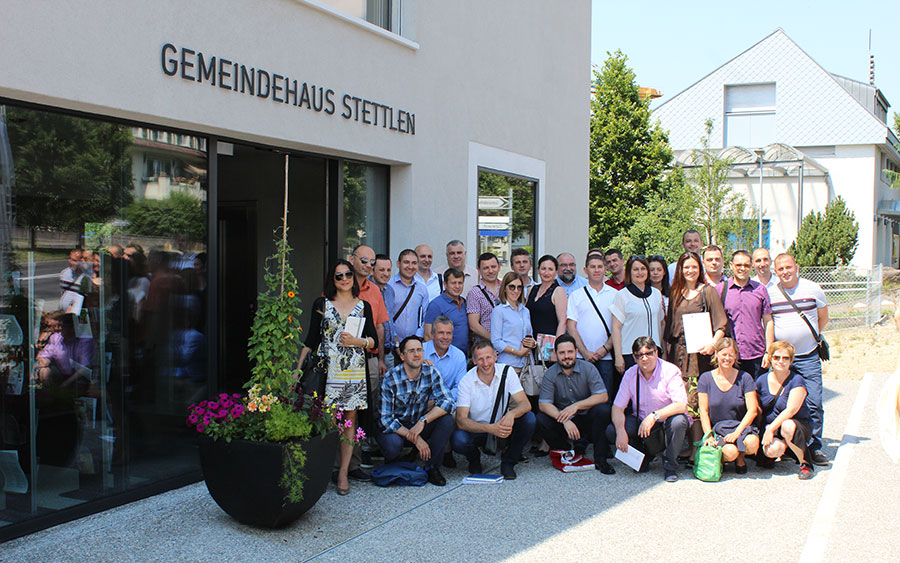In the framework of the European PROGRES programme, representatives of 25 local self-governments from the South East and South West Serbia paid a five-day study visit to Switzerland where they had an opportunity to learn more about the concept and principles of good governance in Switzerland.
During the visit, the representatives learned about the organisation of local self-governments in Switzerland, their financing and competences, citizen participation and models for regional cooperation in the fields of public transportation, culture, economy, etc.
The delegation visited four local self-governments near Bern and learned more about the functioning of Stettlen, a small Swiss municipality. Stettlen Mayor Lorenz Hess presented the main municipal planning documents, noting that stage-based development was the municipality’s priority and that timely provision of information to the residents was the key to success.
During the visit to Hauteville, the delegation learned more about the mechanisms ensuring citizen participation and inter-municipal cooperation. Their attention was focused on measures for sustainable development of local economy and inter-municipal cooperation in the area of service provision. Crna Trava and Vlasotince seized the opportunity to highlight their cooperation in that particular area established through a joint welfare institution.
In Huttwil, Serbian local self-government officials attended the citizens’ meeting where they gained a first-hand experience of direct citizen participation in a discussion and subsequent adoption of the 2016 budget and were thus given a practical example of direct democracy.
“This was a chance to gain a first-hand experience of the way democracy works in Switzerland: divided into small municipalities, where citizens form assemblies and take decisions via referendums. The way Switzerland functions is impressive and the study visit allowed us to understand the system underlying its everyday functioning,” said a representative from Aleksinac Uros Velikovic. Despite the huge differences in governmental organisation between Serbia and Switzerland, everyone agreed that that are certain elements Serbia could apply without any delay, such as improved coordination and greater citizen participation in decision making.
During the visit to Thun, the representatives of this town explained that the central government hardly ever introduced any changes to the system. They said that the majority of initiatives were being undertaken at the grassroots level, adding that municipal assemblies were obliged to represent the interests of their residents, honouring the trust citizens had placed in them.
“The study visit topped off the knowledge we had gained in six workshops held over the past year and a half. The participants in those workshops showed commitment and readiness to engage and acquire skills they would apply later on to local circumstances in Serbia. The management is a process in which the vision, transparency and consensus of all parties are of crucial importance,” said Mirjam Strecker, an expert in good governance from Switzerland.
The European PROGRES has devoted special attention to good governance activities in an effort to help the local self-governments improve their work by the way of introducing the principles of efficiency, transparency, accountability, civic participation and antidiscrimination.
“Our common goal is to build municipal capacities for good governance and initiate structural reforms at the local level. As the donors, the EU and Swiss Government will continue to support local self-governments on that path,” said Ana Nedeljkovic, Good Governance and Social Inclusion Sector Manager of the European PROGRES.
The European Union and the Government of Switzerland support the activities of the European PROGRESS programme, which contributes to the sustainable development of the South and South West Serbia, with a total of EUR24.46 million. Approved projects will be aimed at strengthening local administration creating a favourable environment for the development of infrastructure and economy as well as improving the implementation of social inclusion and employment policy. The programme is implemented by the United Nations Office for Project Service (UNOPS).
The municipalities included in the programme are as follows: Novi Pazar, Ivanjica, Nova Varos, Priboj, Prijepolje, Raska, Sjenica and Tutin in South West Serbia, as well as Prokuplje, Blace, Zitoradja, Kursumlija, Leskovac, Bojnik, Vlasotince, Lebane, Medvedja, Crna Trava, Vranje, Bosilegrad, Bujanovac, Vladicin Han, Presevo, Surdulica, Trgoviste, Brus, Aleksinac, Gadzin Han, Doljevac, Merosina, Svrljig, Babusnica, Bela Palanka and Knjazevac in South East Serbia.




